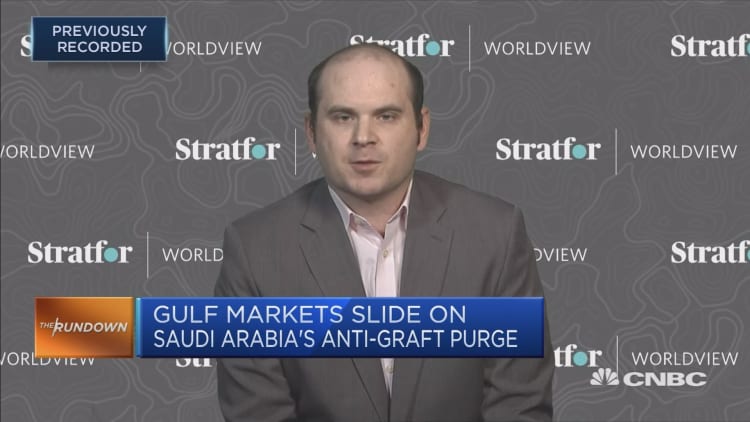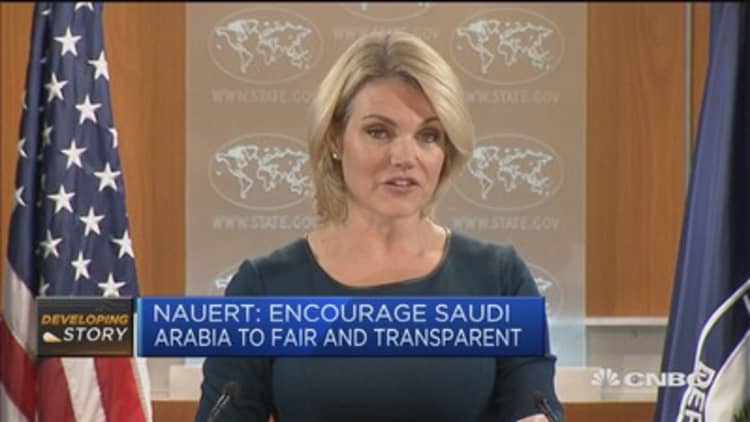The White House has condemned a missile attack by Yemen's Houthi militias on Saudi Arabia and said Iran "enabled" the attacks which had threatened stability in the Middle East.
"Houthi missile attacks against Saudi Arabia, enabled by Iran's Islamic Revolutionary Guard Corps, threaten regional security and undermine UN efforts to negotiate an end to the conflict," it said in a statement, reported by Reuters Wednesday morning.
The statement comes after Saudi Arabia accused Iran of being behind a ballistic missile attack on Saturday carried out by Houthi rebels in Yemen. Iran has been accused of backing the militias and supplying missiles, but Iran's UN Ambassador Gholamali Khoshrou described the allegations as "unfounded," according to the Tasnim News Agency.
Saudi Arabia said the missile on Saturday was intercepted as it headed towards the Saudi capital Riyadh.
The ongoing civil war in Yemen is akin to a proxy war between Saudi Arabia and Iran and their competing ideologies of Sunni and Shia Islam, respectively. While Sunni-ruled Saudi Arabia backs the government of President Abdrabbuh Mansour Hadi, its rival Iran backs the pro-Shia Houthi movement that is loyal to the country's former president Ali Abdulla Saleh.

Saudi Arabia said it viewed the missile attack as an "act of war" by Iran, increasing the possibility of a military clash between the two regional rivals.
Allies and enemies
The White House's comment comes after U.S. President Donald Trump gave his backing to Saudi Arabia and called on the Kingdom and its allies to isolate Iran and counteract its influence in the Middle East. It also comes amid action from Saudi Arabia's royal leadership to reform the country and crack down on corruption, actions that have been praised by Trump.
Timothy Ash, a strategist at BlueBay asset management, said in a note Wednesday that for the Trump administration "the threat from Iran remains and is rising" and that it was likely to ally itself more with Saudi Arabia.
"The U.S. needs to return to old, tried and tested relationships, with Israel and Saudi Arabia being cornerstone U.S. allies in the region," he said.
Ash believed Saudi Arabia's reform plan was "meant to make U.S. re-engagement with Saudi Arabia easier as (Saudi Crown Prince Mohammed bin Salman) is offering a reform vision for Saudi Arabia and a reform vision for Islam, to counter the risks of religious extremism."

The ramping up of bellicose rhetoric from Saudi Arabia has prompted concerns that a military conflict with Iran could be on the horizon, although not all analysts share that view.
"Saudi Arabia is not going to be entering into any hypothetical war while it is purging senior members of its own military nor while it seeks to carry out its Vision 2030 (economic reform) strategy," James Pothecary, a political analyst at global risk consultancy Allan & Associates, said in a note Wednesday.
"Likewise Iran, reintegrating into aspects of the world economy, will make no such move. This kind of rhetorical saber-rattling occurs regularly — just this May, Iran's defense minister threatened to leave 'only Mecca and Medina' untouched. A distinction must be made between rhetoric aimed at appeasing domestic populations and genuine intention to launch large scale military operations," he said.


